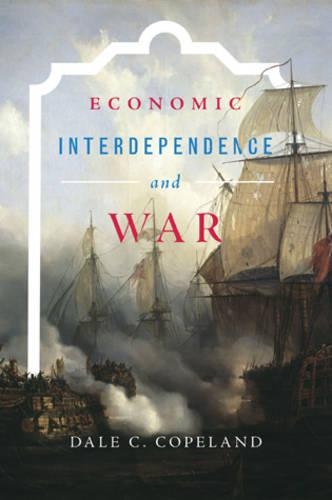
Economic Interdependence and War
(Paperback)
Publishing Details
Economic Interdependence and War
By (Author) Dale C. Copeland
Princeton University Press
Princeton University Press
12th January 2015
United States
Classifications
Tertiary Education
Non Fiction
Political science and theory
International economics
327.101
Short-listed for Choice Magazine Outstanding Reference/Academic Book Award 2015
Physical Properties
Paperback
504
Width 156mm, Height 235mm
680g
Description
Does growing economic interdependence among great powers increase or decrease the chance of conflict and war Liberals argue that the benefits of trade give states an incentive to stay peaceful. Realists contend that trade compels states to struggle for vital raw materials and markets. Moving beyond the stale liberal-realist debate, Economic Interd
Reviews
Winner of the 2017 ISA Annual Best Book Award, International Studies Association One of Choice's Outstanding Academic Titles for 2015 "This bold, well-written, and landmark work draws together the fields of international political economy and security studies. It also illuminates modern international history and the future."--Choice "[A] landmark book."--Foreign Affairs "[A] stimulating and penetrating book... A landmark contribution to the ongoing debate on the relationship between interdependence and peace."--Jack Snyder, International Security "Exhaustively researched... Copeland is a rarity among contemporary international relations scholars."--Erik Gartzke, Political Science Quarterly "Economic Interdependence and War is international relations on a gigantic scale. Copeland asks big questions, makes big arguments, engages big alternatives, and tests them all on big powers over a big time span... Books like this one are a healthy reminder that there remains trenchant things to say about the big picture... A work of passion, conviction, and erudition."--Joseph Parent, Perspective on Politics "This book provides a novel, nuanced and highly illuminating examination of the relationship between economic interdependence and war... The book's central arguments and findings will also be of clear interest and importance for current and future policy makers as they seek to grapple with the long-term effects of increasing economic interdependence."--Stephen Ellis, Political Studies Review "This landmark book makes bold arguments and parallel big achievements. On theoretical front, the book succeeds in presenting that as an amalgam of liberal and realist approaches, future trade expectation theory has a significant deductive and explanatory power. On empirical front, the book is one of the best case studies that go in depth based on the diplomatic-historical evidence among the existing large-N quantitative empirical studies."--Hakan Mehmetcik, Journal of Global Analysis
Author Bio
Dale C. Copeland is an associate professor in the Department of Politics at the University of Virginia. He is the author of The Origins of Major War.
